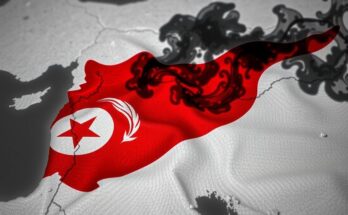Qatar’s Emir, Sheikh Tamim bin Hamad Al-Thani, termed the recent military actions in Gaza and Lebanon as “collective genocide” amid increasing violence in the region. His comments came during the Asia Cooperation Dialogue summit in Doha, where he criticized Israel’s military operations and their humanitarian impact, particularly regarding the conditions in Gaza.
Emir Sheikh Tamim bin Hamad Al-Thani of Qatar has characterized the ongoing violence in the Middle East, particularly in relation to the Israeli military operations in Gaza and Lebanon, as “collective genocide.” This assertion signifies Qatar’s longstanding concerns regarding Israel’s impunity in the region. Sheikh Tamim’s statements were made during the Asia Cooperation Dialogue summit held in Doha, where he expressed his nation’s dismay over the escalating conflict and the resultant humanitarian crisis. Qatar has actively sought a peaceful resolution to the hostilities in Gaza; however, efforts for a ceasefire with Hamas have been hampered by Israeli actions. The situation has grown more precarious recently, especially following intensified assaults by Israel in Lebanon, leading to reciprocal missile strikes from Iran and raising fears of a broader regional conflict. Sheikh Tamim elaborated on the dire circumstances in Gaza, emphasizing that it is being rendered uninhabitable and is witnessing preparations for the displacement of its populace. He stated, “It has become crystal clear that what is happening is genocide, in addition to turning the Gaza Strip into an area unfit for human habitation, in preparation for displacement.” Furthermore, the Emir condemned the airstrikes and military operations launched by Israel against Lebanon, highlighting the grave toll these actions have taken on innocent lives. Israel rejects accusations of committing genocide, notwithstanding the reported death toll in Gaza, which exceeds 41,500 Gazans in the past year alone. Additionally, reports indicate that Israeli ground operations in Lebanon have resulted in over 1,900 civilian casualties since October 8. This escalating violence not only threatens to destabilize the region but also poses significant humanitarian challenges, exacerbating the plight of civilians caught in the crossfire. In summary, the ongoing crisis in the Middle East, described as genocide by the Emir of Qatar, underscores the urgent need for a diplomatic solution to the conflict and highlights the critical humanitarian issues facing those affected. The international community must address these concerns to prevent further escalation and suffering in the region.
The current situation in the Middle East, particularly the Israeli-Palestinian conflict, has resulted in significant humanitarian crises. The recent escalation of violence, particularly in Gaza and Lebanon, has sparked international concern, especially with the use of military force and the impact on civilian populations. Qatar has played an active diplomatic role in this conflict, attempting to mediate peace and provide humanitarian aid, while facing challenges from Israel’s military actions. The perception of genocide emerges from the severe and often disproportionate military response to Palestinian resistance, leading to high civilian casualties and severe destruction of infrastructure.
In light of the statements made by Emir Sheikh Tamim bin Hamad Al-Thani, it is imperative to recognize the ongoing humanitarian crisis marked by escalating violence and its effects on civilians in the Middle East. The description of these actions as “collective genocide” brings to the forefront the urgent need for a resolution to the conflict, emphasizing the responsibility of the international community to intervene and offer support for diplomatic solutions that prioritize human rights and civilian safety.
Original Source: www.newarab.com




